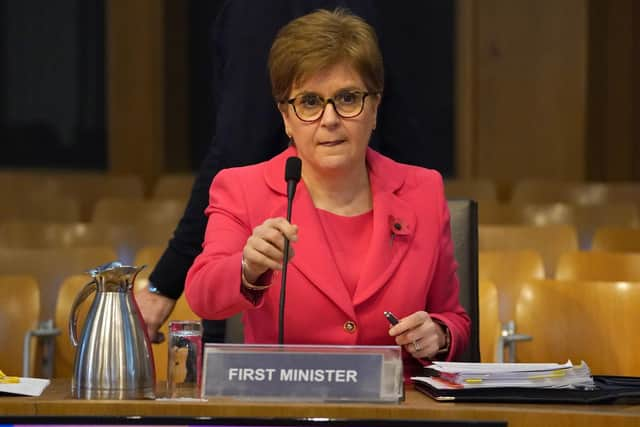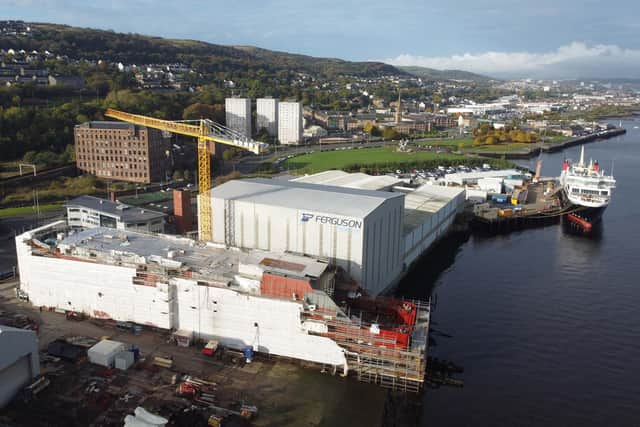Scotland's ferries fiasco: Nicola Sturgeon defends Derek Mackay, stating she would have made same decisions around scandal-hit ferry contract
This article contains affiliate links. We may earn a small commission on items purchased through this article, but that does not affect our editorial judgement.
Islanders who have been left without a reliable lifeline ferry service for years, waiting on long-promised, but seemingly never-arriving new ships, didn’t get the courtesy of an apology. Instead, the session of the public audit committee was dedicated to evading and pinning blame anywhere but on the First Minister and her Cabinet.
This is a scandal that will cost the taxpayer at least £300 million, probably approaching closer to £400m once other costs are taken into account, for two ferries initially costed at £97m. These ships, the Glen Sannox and the as-yet unnamed hull 802, may not even run on their originally planned routes in the Clyde and Hebrides network. The Glen Sannox, heralded as a greener, cleaner, ferry, will run on diesel due to a failure to order key safety sensors.
Advertisement
Hide AdAdvertisement
Hide AdFerguson Marine, a shipyard saved by SNP-supporting, pro-independence businessman who advised former first minister Alex Salmond on economic matters, was awarded the yard despite its lack of track record for ships the size of hulls 801 and 802. Rescued in the middle of the independence referendum campaign by Jim McColl following Mr Salmond’s intervention, the deal to build the two ships at the yard was hailed as the return of shipbuilding to the historic Clyde.
But the romantic notion of an industrial Scottish shipbuilding industry has been long in terminal decline. The company later collapsed, forcing it into public ownership and yet more taxpayer costs. In 2022, the Government admits the yard is not competitive enough. It is nowhere near ready to be an asset to a private owner, Ms Sturgeon admitted.
The questions that needed answering on Government accountability, the First Minister’s own involvement, and the culture within Government around transparency and decision-making went unanswered.
Why wasn’t a key meeting with Mr McColl in 2017 clearly minuted? Who does Ms Sturgeon truly believe should take the blame for what Craig Hoy, one of the Conservative members of the committee, described as a “monumental scandal”? Why was the decision to nationalise the yard made by a junior minister, not the collective Cabinet?
Throughout, however, it was clear that sorry appeared to be the hardest word for the First Minister. Pressed to apologise by Mr Hoy, Ms Sturgeon repeated the line that she “deeply regret[s]” the “impact on island communities”.


What about those allegations in the BBC Disclosure documentary of a “rigged” procurement process? Was the deal “jobs for the boys”, as it was put by Tory MSP Sharon Dowey? This, the First Minister, was happy to “completely and utterly refute”. It was “absolutely, categorically not” the case there was any inappropriate attempt to steer the decision towards Ferguson Marine, she said.
Questions around whether the fact a technical document, far more detailed than those available to other bidders, found its way into the hands of FMEL was a breach of contract or confidentiality went unanswered. Nor was there a commitment to internally investigating the issue. Instead the First Minister pointed to the Auditor General.
The future of the yard is in significant doubt. Mr Hoy, following an exchange that visibly irritated the First Minister, asked why it was the jobs of welders, painters, and cleaners who might lost their jobs while she kept hers.
Advertisement
Hide AdAdvertisement
Hide AdThe answer was defiant. “A key driver of the Scottish Government has been to protect employment and I make no apology for that.”


Who, then, the committee asked, is culpable, if not the First Minister? “A fundamental responsibility and my responsibility is to ensure that we deliver the contract and that the vessels are completed,” the SNP leader said, and “that we properly learn the lessons that need to be learned – I am very serious about that responsibility”.
It was at this point Ms Sturgeon appeared to suggest the decision to nationalise the shipyard, alongside many other key decisions made in connection with the ferries fiasco, had been made unilaterally by individual ministers. The decision to nationalise the yard did not appear to have been brought before Cabinet and signed off as a Cabinet decision, she told committee convenor Richard Leonard.
"The submissions on that will have been circulated and provided to the relevant ministers, and the minister at the time would have updated Cabinet periodically, I think, on the progress of that,” she told MSPs. “Ministers are tasked to get on with the jobs within their portfolios and they will report back to Cabinet, they’ll update Cabinet, colleagues can ask questions.”
The only aspect of the scandal that Ms Sturgeon appeared to have any certainty around was who she thinks is to blame and who has escaped their fair share of scrutiny. Luckily for the disgraced former finance secretary Derek Mackay, the SNP leader refused to throw him under the bus. Instead, the victim is the management and ownership of Ferguson Marine prior to its Government buy-out in 2019. In short, blame Mr McColl.
This was where the First Minister reserved the bulk of her anger at the scandal. She said: "But nor do I think it can be escaped that this was a contract that a private company signed up to, contracted to do a job that hasn’t been done, and therefore there is also a significant degree of responsibility, in my view, that has to rest with FMEL and the management of FMEL at the time.
"Not sole responsibility, and I’m not saying none of their concerns are legitimate, but they have to be part of this too. While I’m sitting here readily accepting that there are lessons for the Scottish Government and our agencies, I’m not sure I have heard that from FMEL.
"I’ve heard lots about why it’s all somebody else’s fault and, absolutely, there is a degree of responsibility that lies elsewhere, but I think it is also important that they recognise, they contracted to do a job that then wasn’t done, and that has to be a significant part of it too.”
Advertisement
Hide AdAdvertisement
Hide AdDespite this evident anger towards FMEL, questions of whether the First Minister may have breached the ministerial code were also raised by the committee. The room heard of a meeting between Ms Sturgeon, Mr McColl and an unidentified special adviser on the issues facing the project. However, it appears no minutes were taken of the meeting and no non-political official was present – a potential breach of the ministerial code that came so close to ending her political career during the Salmond inquiry.
In any case, the session established that despite the six-year delay, the overspend worth three times the budget, a failed shipyard, and millions spent trying and failing to turn Ferguson Marine around under public ownership, the First Minister would have likely made the same decision as her then-junior transport minister, Mr Mackay.
Asked about what mistakes she made, Ms Sturgeon said that she had “tried to put myself in the shoes of the minister” and asked whether she would have taken the same decision. “Based on all of that information, I think that was, at the time, based on what was known, was a reasonable decision to have taken,” she said.
The First Minister was also unwilling to go as far as saying the contract should have been retendered due to the problems and concerns set out by CMAL at the time. “If at the time of October 8 2015, if we had known probably a fraction of what we know now, then clearly you would wish you’d taken a different decision. But we didn’t know that at the time,” she said.
The inquiry will continue in the parliament, with additional evidence expected to be requested from the then infrastructure minister, Keith Brown. Expect more questions around government culture, of a failure to be transparent, and the political judgements made around the time.
However, much like the answer to whether the two ferries at the centre of the scandal will ever sail as intended, whether we get any clarity in answers to this “monumental scandal” is shrouded in fog and remains to be seen.
Want to hear more from The Scotsman's politics team? Check out the latest episode of our political podcast, The Steamie.
It's available wherever you get your podcasts, including Apple Podcasts and Spotify.
Comments
Want to join the conversation? Please or to comment on this article.
